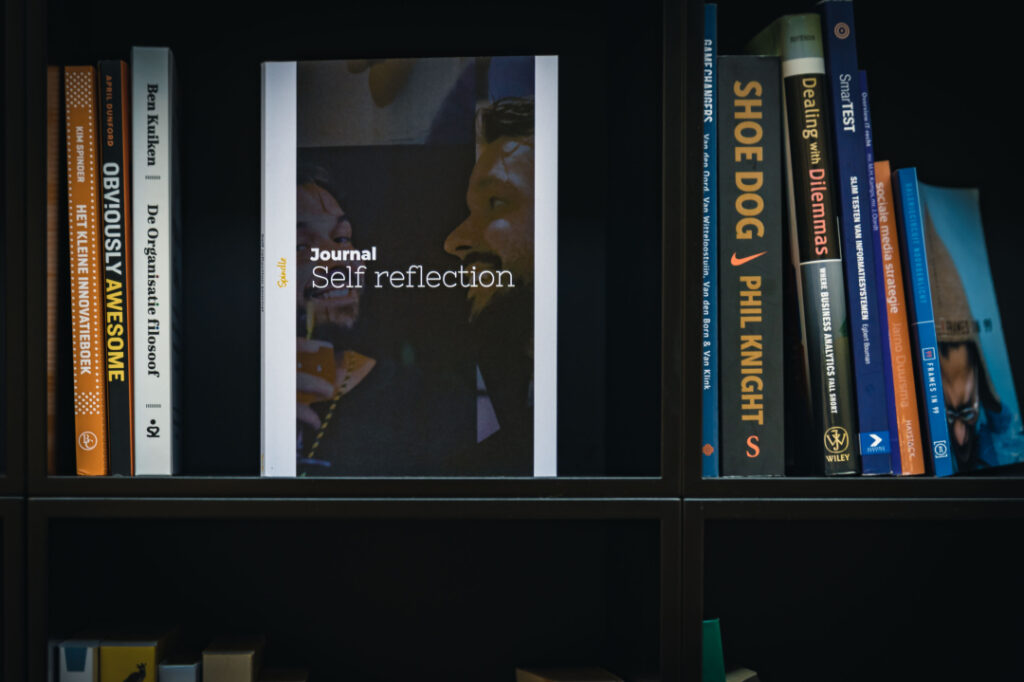Facilitating colleagues to grow their own careers
Written by Rosien van Toor on 10th June 2021
You might already know that we don’t have managers at Devhouse Spindle. But did you know that we also don’t have annual performance reviews? Don’t cheer too hard, because that doesn’t mean that you don’t have to dig into your own performance or your wishes for the future.
It’s easy to be swooped up by day-to-day work, exploding to-do lists, projects, and meetings, which makes it difficult to reconnect your daily routine to the bigger picture of developing your own career. However, we believe that doing this is incredibly important. It’s worth it to set aside some time to think about how all your regular tasks help you move forward.
At Spindle you have a lot of freedom in shaping your own career, making optimal use of your talents and skills, and fitting them to the roles you fill in the organization. To aid in this personal career development, we have a process for each colleague to reflect on their progress throughout the year and plan their ambitions for the coming year. Each year, we encourage colleagues to set aside some time and create some mental space for themselves to 1. reflect on the past year and 2. think about the year ahead. In this blog post you can read all about our reflection-and-ambition cycle.
Freedom and responsibility
Having autonomy and freedom are important in a self-organizing organization: you have a considerable amount of autonomy within your roles and this translates to having autonomy and taking ownership of your own career. After all – if you are not responsible for your career, can you expect someone else to be? This might sound harsh and maybe even cynical, but it puts the ownership for personal and professional development squarely where it belongs: on you.

Career-related questions are big, though. There’s an entire industry of job coaches, advisors, and assessments revolving around it. So it wouldn’t really be fair if we’d say: “Good luck with all these Major Life Questions! Let us know when you’ve figured it out and plow away at your tickets in the meantime!” Exactly because these are Big Questions, it’s often easiest to postpone them and focus on the manageable stuff instead: the next item on your to-do list for example, the next bug that needs to be resolved, the newest feature to be released… So to give these Major Life Questions both the time and importance they deserve, we give colleagues time and guidance to think about their career progression in two ways. Firstly by reflecting on what they accomplished during the previous year, and secondly by planning what they want to accomplish and how they want to grow in the coming year.
Reflecting on the past year
The year coming to an end is a period of reflection for many people. Typical questions you ask yourself and others are: How was this year for you? What did you learn? How do you look back on your accomplishments? What made you happy at work? At the end of the year we ask ourselves these questions, reflect on them on a professional level, and write down our thoughts. You write this reflection for yourself, although it’s encouraged to share it with others and the vast majority of colleagues put it on our shared drive for everyone to read. There are many teams that use these reflections as input for a collective reflection on the past year.
For 2020, of course, we included some questions about the impact of the pandemic and working from home. Other topics covered are gratitude, strengths, purpose, happiness, and collaboration. We give all colleagues a list of questions to answer within each of these topics. We also include a few questions to ask the colleagues you work closely with. Sometimes those you work with see things that you might miss when you reflect on yourself, so having the input of others helps to have a more complete reflection of yourself.
Self reflection as a skill
Although we focus a lot on reflection at the end of the year, we also make it a point to reflect throughout the year as well. After all, if you reflect often, its easier to come up with thoughts on what happened at the beginning of the year.
Last year we published our Self Reflection Journal, which was aimed at creating a daily habit of self reflection. The end-of-year reflection is much bigger and much more in-depth. Most colleagues end up writing several pages, guided by question prompts. This type of reflection is not always easy. Last year was especially hard for many people, for obvious reasons. But this hardship, no matter how shitty, can also provide some valuable insights but only if you take the time to reflect on them. That’s why honing the skill of self reflection is so essential for personal and professional development. Like other skills, this is something that can be practiced. Practicing once a year is not a particularly efficient way to learn anything, that’s why we complement it with building reflection as a habit, but it is nice to go deep sometimes.

Growing your career throughout the year
As mentioned, this reflection-and-ambition cycle is a two-part cycle: after reflecting on the past year we turn our gaze to the year ahead. Somewhere in the first few weeks of the new year we ask everyone to create an ambition plan for the new year. This ambition plan is much more free-form than the reflection. It doesn’t even have to be a written document as long as it can be shared with others. So far no one has picked up the challenge to submit a song or dance, but that would be amazing. There are fewer guiding questions, although we do provide some prompts for inspiration.
The main question to answer is How do you want to develop yourself in 2021? Anything goes – of course you look at the roles you fulfill, but we encourage you to also look at which direction you want to take your career, and the role that work plays in your life in general. It’s also encouraged to include non-work related ambitions. For example, many people include ambitions related to (mental) health, or their living, housing or financial situation, or something related to sports or other hobbies they have.
Invite others in
Next, it’s time to share your ambitions with others. Most circles arrange a team session where every member gets to present their ambitions. During this time, colleagues can ask questions, and give advice, feedback, and support. What’s really cool about these sessions is that you realize you are rarely alone in your ambition to do something, and it makes it really easy to get support from coworkers. Sometimes spontaneous mentoring/coaching/training structures emerge. Sometimes people are challenged to be more ambitious, and sometimes people are reminded to not forget to take time for themselves. In any case, sharing your ambitions, dreams and plans with others almost always makes them better. Knowing all this, you can’t help but wonder why other companies still have those dreadful annual performance reviews.
Looking at the bigger picture is important, but it is also difficult. As a company, we think that giving it the time and place helps each and every colleague to grow further as an individual and as a professional. By giving it a format, we aim to make it less overwhelming and easier to learn from. If you have any questions or tips, please let us know in the comments!




Your thoughts
No comments so far